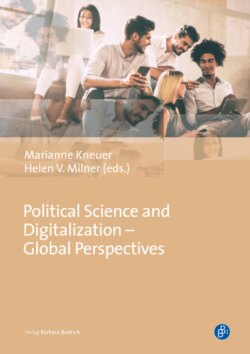Читать книгу Political Science and Digitalization - Global Perspectives - Группа авторов - Страница 16
На сайте Литреса книга снята с продажи.
4 Digital era and research
ОглавлениеThis section looks at research in its relationship with digitalization as an object of study, rather than as an instrument13. Two institutional data sources are used: final theses data from UMSA’s political science program14 and journals from UMSA, UCB, UNSLP and ABCP. This responds to the fact that other research conducted by the political science programs (theses, journals, or books) are not available online. By itself, this is revealing about the relation between digital tools and research. From data on 205 final theses, only three have an explicit object related to digital technology, all of them, as expected, during the XXI century: one about education (Plata 2006) and two about electoral processes or camaigns [26] (López 2016, Torrez 2015). Two others do not explicitly have an ICT-related investigation object but indirectly study processes connected to digitalization: one related to globalization and the other to political marketing. This scenario may not be completely representative for all Bolivian political science as it is in the cases of curricula.15
When it comes to publications, this paper addresses five journals16: Ensayo and Revista Ciencia Política (from UMSA), Ciencias Políticas (from UCB), Análisis Político (from UNSLP), and Revista Boliviana de Ciencia Política – RBCP (from ABCP). It is important to state that none of the journals display their content online – except for RBCP – nor their indexes – except for the aforementioned and Análisis Político. The purpose here is to describe when and where digital-related topics were analyzed.
Ensayo was the first journal aimed at analyzing political phenomena. It started in the late 1980s and published three issues, with a total of 23 papers were published, among other documents and book reviews.17 The other journal from UMSA, Revista Ciencia Política, started in the 1990s and went through two eras. In the first era, a total of sixty papers were published until 2003, while in the second era, from 2007, eighty-two articles were published18. Within this journal, in both eras, there is only one paper that can directly relate to digital topics, by studying cyber-democracy (Balderrama 2012). It is understandable that Ensayo and the first era of Revista Ciencia Política don’t have any technology-related papers, since they were issued in a time where most of those technologies didn’t yet exist or were unavailable in Bolivia.
The first journal from a private university is Análisis Político from UNSLP which started in 1997. This publication issued 20 editions of the journal in which a total of 241 papers were published, and from those, nine related to digital topics and politics by analyzing the effects of globalization and technology through social and cultural effects over politics (Paz-Navajas 1998, León 1997, Riveros 2004, Fernández 2005), or by studying the relation between ICT and democracy (Fernández 2001, Dader 2002, Aliaga 2007) or elections and political communication (Gómez 2002, Badillo y Marenghi 2002). The second private university with its own journal is UCB which has issued two numbers of its recent journal, Ciencias Políticas. In these two editions, nine papers were published, and despite its recent creation, digital issues seem to be popular since already two of the papers address the topic: one about the use of Facebook in elections (Vélez 2017) and the other about digital diplomacy (Lazarte 2017).
Finally, a recent enterprise, Revista Boliviana de Ciencia Política, launched by the Bolivian Political Science Association, has published two issues in which there are 11 papers, in general, and two of them have a relationship with digital issues: a first one studies the situation of ICT, or its effects, in politics and political science (Alcántara 2017), and a second one studies the Twitter account of Evo Morales (Ojeda 2018). On the other hand, by the specific content of the article, there is one about “ethnic” voting and electoral [27] support for the MAS (Centellas 2017) that uses statistical models to assess its research question and processes the data in a computational software, such as Stata.
Nevertheless, the most important aspect of RBCP in relation to ICT appears when analyzing the structure of the journal. One can observe that the journal itself uses digital media like Facebook to enhance interaction with scholars all around the world, including inviting them to contribute.
In total, from 426 papers published by all institutional journals of political science programs and networks, 14 are related to digital issues, meaning that only a 3.3 % of all analyzed works study, directly or indirectly, the relationship of digital era/technology/information society and politics. Attempting to control for period of time, 283 papers were published during the twenty-first century, meaning that those 14 total technology-related papers constitute the 4.95 % of the total.
Beyond these academic-institutional experiences, there are a few other institutions, mainly NGOs that focus and/or use digital technology and its relation to politics. For example, Ciudadanía, based in the city of Cochabamba, applies its own data gathering and survey management system called ADGYS (Android Data Gathering System) a project developed in combination with LAPOP (Latin American Public Opinion Project). The products of this system are political culture studies based on individual-level data. Similarly, Fundación Redes, studies and attempts to intervene on information society and democracy within it, though following a more sociological approach.
These situations − digital study objects or tools in Bolivian political science − are not very common. One may think that only quantitative research is related to the use of technology or digital tools. Even if that is correct, Bolivian political science rarely makes quantitative research with the exceptions of Ciudadania’s studies. But recent methodological advances in social and political sciences have demonstrated that qualitative research can also take advantage of digital tools.
